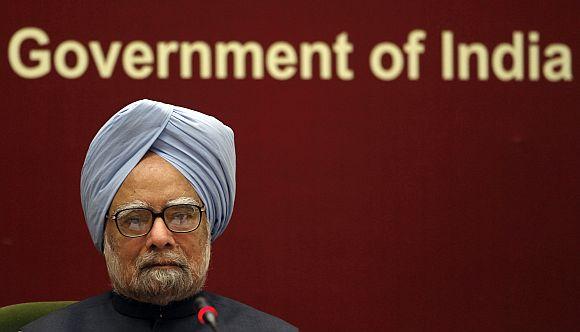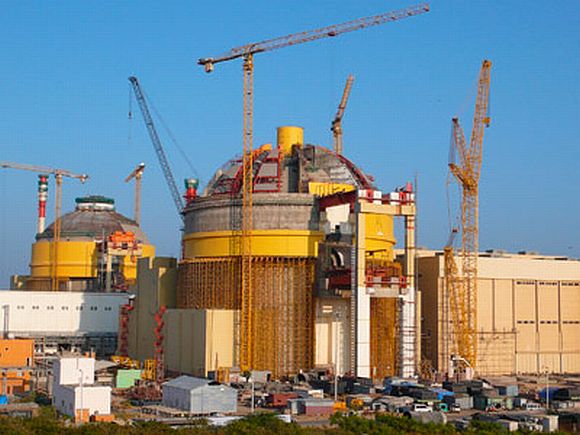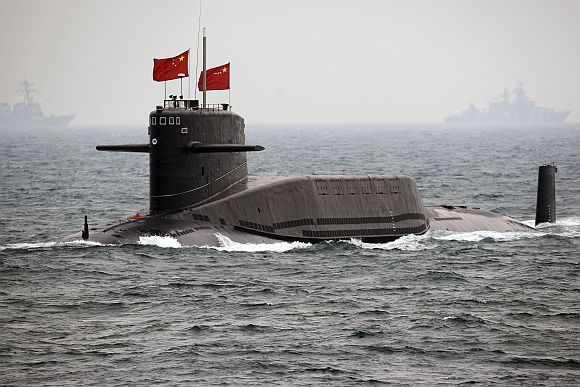Photographs: Reuters Praful Kumar Singh
The freeze FDI in retail forced on him notwithstanding, Prime Minister Dr Manmohan Singh focuses on nuclear deals with Russia and Japan that have been stagnating for the past few months, reports Praful Kumar Singh
Foreign direct investment in the retail sector was intended to re-energise Dr Singh's second term in office and would have helped the Indian economy, which is witnessing a downslide.
The failure of the Manmohan Singh government to get the reform in retail implemented will not only undermine efforts to revive growth and curb inflation, but has also dealt a serious blow to the leadership of the prime minister.
Please ...
Increase in the number of N-plants on top of Dr Singh's agenda
Image: File picture of Dr Singh with Russian President Dmitry Medvedev during the latter's trip to India in December 2010Photographs: Reuters
Dr Singh will be off to Russia on a three-day trip from December 15 while Japanese Premier Yoshihiko Noda is visiting India in the last week of December. The prime minister wants to use both opportunities to negotiate nuclear cooperation pacts.
Despite the delay in the scheduled commissioning of the first two reactors at Koodankulam nuclear power project in Tamil Nadu due to protests, Dr Singh is expected to sign new contracts for the third and fourth reactors at the same site during his visit.
Papers are also being prepared to sign a civil nuclear cooperation pact with Japan to import nuclear technologies that were put on hold following the Fukushima Daiichi power plant crisis that was caused by a tsunami and earthquake on March 11 this year.
Sources said an increase in the number of nuclear plants in the country is on top of Dr Singh's agenda in dealing with all nuclear power nations, as he knows that is the only way India can meet its growing energy needs.
Koodankulam project was supposed to be commissioned before PM's Russia trip
Image: The nuclear reactors at the Koodankulam project in Tamil NaduPhotographs: Courtesy: Wikimedia Commons
Russia has been helping India in the field of nuclear power even before the Nuclear Suppliers Group granted a clean waiver to it in September 2008.
The Koodankulam project, where the two reactors were supposed to be commissioned before the PM's Russia trip, was conceived and its construction started much before the waiver came.
The agreement for the two reactors was signed back in 1988 when there was no civil nuclear liability law in the country and hence the protesters assert that this law enacted only last year may now cover any mishap.
The state-owned Nuclear Power Corporation of India Limited, which is the only agency allowed to produce nuclear power, has developed two reactors of one gigawatt each at Koodankulam with the assistance of Russia's Atomstroyexport.
Military deals, concern over Chinese excesses, also on the table
Image: A Chinese Navy nuclear submarine takes part in an international fleet exercisePhotographs: Reuters
Sources say Russia is quite keen to expand the capacity of the project by installing six reactors at the site and also supply enriched uranium for them. As such, it will seek an assurance from Dr Singh on the future of the Koodankulam project.
Other issues that may come up for negotiation and agreement during Dr Singh's Russia visit include the need for attack helicopters, a joint venture for steel production in India, banking, science and technology cooperation.
As regards the nuclear deal with Japan during its premier's visit to Delhi, External Affairs Minister S M Krishna has already done the foundation work during his Tokyo visit in October, hoping that the nuclear accord will materialise sooner rather than later.
The actual negotiations with Japan had begun in June last year, and three rounds of talks had already taken place before the Fukushima disaster put a brake on further talks.
Other issues that may figure in the two primer ministers' meeting will be common expression of concern over the Chinese military activities in the region, sources said.





article